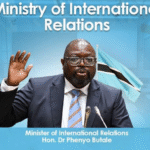By Jeffrey Stein
London, UK – In a move laden with historical significance and fraught with controversy, the United Kingdom has officially transferred sovereignty of the Chagos Islands to Mauritius. The transfer, aimed at resolving a long-standing dispute, was finalized following a last-minute legal challenge that briefly threatened to derail the agreement.
The archipelago, located in the Indian Ocean, is strategically important due to the presence of Diego Garcia, the largest island which hosts a crucial US-UK naval and air base. Under the terms of the agreement, the UK will pay Mauritius €120 million annually to lease back the base for at least 99 years.
Prime Minister Keir Starmer defended the decision, emphasizing the critical role the base plays in national security. “The base is right at the foundation of our safety and security at home,” he stated at a military headquarters near London, highlighting its importance for counterterrorism and intelligence operations. “By agreeing to this deal now on our terms, we’re securing strong protections, including from malign influence, that will allow the base to operate well into the next century, helping to keep us safe for generations to come.”
However, the move has drawn sharp criticism. Opponents argue that relinquishing control of the islands, which have been British territory for over two centuries, could open the door to interference from countries like Russia or China. Opposition leader Kemi Badenoch voiced her disapproval, stating, “We should not be paying to surrender British territory to Mauritius.”
The agreement also faced staunch opposition from former island residents, known as Chagossians, who were forcibly displaced decades ago to facilitate the construction of the military base. They fear that the transfer of sovereignty to Mauritius will further complicate their efforts to return to their homeland.
The signing ceremony, scheduled to take place virtually between Prime Minister Starmer and Mauritian leader Navin Ramgoolam on Thursday morning, was delayed at the eleventh hour. A judge granted a last-minute injunction sought by two Chagossian women, Bernadette Dugasse and Bertrice Pompe, who argued the agreement would hinder their ability to return to the islands.
“We are very scared that once Mauritius takes over, it will be even harder for us to ever go home,” said Dugasse, echoing the concerns of many Chagossians.
The injunction was ultimately lifted by another judge, clearing the way for the agreement to be finalized and implemented. While the legal hurdle has been overcome, the underlying tensions surrounding the Chagos Islands remain, highlighting the complex and sensitive nature of this historical transfer of sovereignty. The long-term implications of the agreement for regional security and the future of the Chagossian community will be closely watched in the coming years.









